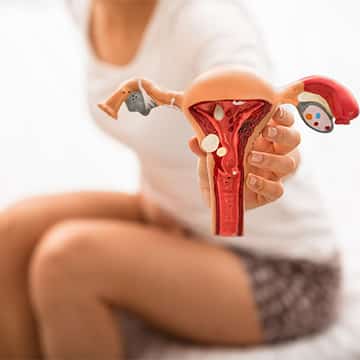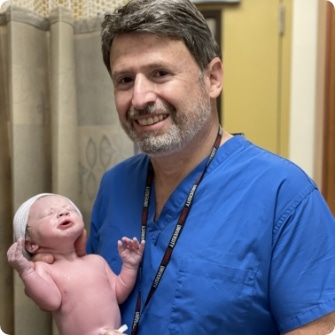
Fibroids are noncancerous growths that develop in the uterus that often appear during a women’s childbearing years. They can vary in size from very small and virtually undetectable to the human eye to large masses that can distort the uterus. You can also have just one fibroid or multiple fibroids. Most women will have uterine fibroids at one point in their lives, but may not know it since they do not experience any symptoms.
“I highly recommend Dr. Tepper!He is highly professional, experienced, and calming. My pregnancy and birth were such a positive experience thanks to him and his lovely staff at the clinic.”
SEE MOREFor those who do develop uterine fibroid symptoms, they may experience:
- Pressure or pain in the pelvic region.
- Heavy bleeding during menstruation.
- Periods that last longer than a week.
- A frequent need to urinate.
- Difficulty emptying the bladder.
- Constipation.
- Leg pains or backache.
While the exact cause of fibroids is not completely understood, it is believed to be caused by a number of factors such as genetic changes, hormones, extracellular matrix (ECM), and other growth factors.

MEET DR. ALEX TEPPER
Welcome to my practice. Let me introduce myself and my practice philosophy. I am a board certified OB/GYN in practice for over 20 years and have been a solo-practitioner on the Upper East Side of Manhattan since 2000. All deliveries are performed at The Mount Sinai Medical Center where I went to medical school and at Lenox Hill Hospital.
Diagnosis and Treatment of Fibroids
In many cases, uterine fibroids are discovered during a routine pelvic exam. If you are experiencing symptoms of fibroids, Dr. Tepper may order some testing to determine a diagnosis, including ultrasound, lab tests, MRI, hysterosonography, and more.
The best treatment method for fibroids may vary depending on your symptoms, the size, number, and location of your fibroids, and your overall health. Remember, fibroids are not cancerous and rarely interfere with pregnancy. For women who are not experiencing any symptoms, treatment may not be necessary. However, the fibroids should be monitored over time.
For those who are experiencing symptoms, treatment options may include:
Medications
- Pain medications: Over-the-counter (OTC) pain medications such as ibuprofen or acetaminophen can be used to control discomfort caused by fibroids.
- Birth control: Birth control can be used to help manage heavy bleeding during and between periods and uncomfortable menstrual cramps. Birth control options include pills, intravaginal contraception, IUDs, and injections.
- Gonadotropin-releasing hormone (GnRH) agonists: These are medications available as a nasal spray or injection. They work by shrinking the size of your fibroids and are sometimes used to make fibroids smaller before removing them in surgery.
- Oral therapies: Oral therapies such as Tranexamic acid or Elagolix can be used to help ease heavy bleeding during your period. Dr. Tepper can speak with you regarding the pros and cons of this therapy and if it is right for you.
Surgery
- MRI-guided focused ultrasound surgery (FUS): This is a non-invasive treatment option to remove uterine fibroids without harming the uterus. It requires no incisions and is done on an outpatient basis. This procedure is performed while you are inside of an MRI scanner during which the exact location of your fibroids is targeted and destroyed using sound waves.
- Myomectomy: During this procedure, your fibroids can be removed without harming the uterus. There are different kinds of myomectomy, and the one that is best for you will depend on the size, number, and location of your fibroids. This is often a good option for women who plan to become pregnant in the future.
- Hysterectomy: If you are not planning on pregnancy in the future, a hysterectomy can be performed to remove your uterus.This option is the only way to completely cure fibroids.
- Radiofrequency ablation (RFA): This option uses radiofrequency to destroy the fibroids, and may be performed laparoscopically, or by transvaginal or transcervical means.
BOOK AN APPOINTMENT
Whether you are a new or returning patient, Dr. Tepper can assess your concerns and discuss your options to find the most comfortable and convenient care for you. To get started, call our office to set up an appointment.
CALL FOR APPOINTMENTContact Us to Learn More
Are you interested in learning more about fibroids and our offered treatment options? If so, contact our New York office today at (212) 828-0900 to schedule your initial appointment with Dr. Tepper.
Our Blog

Preterm Labor: Are You At Risk?

Postpartum Depression: Symptoms, Causes, and Treatments




